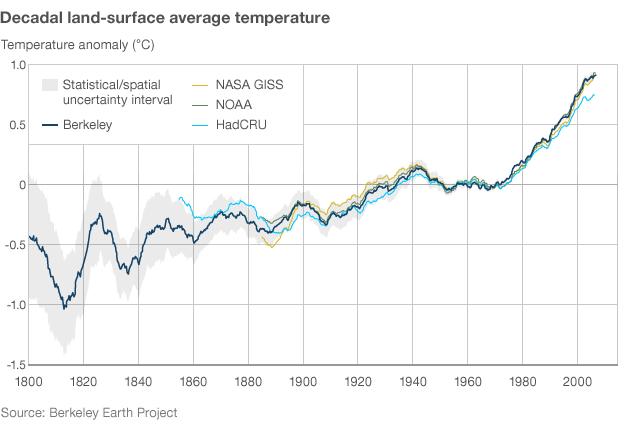Police end 'ClimateGate' inquiry
- Published

The Climatic Research Unit (CRU) compiles one of the most widely used temperature records
The police investigation into the so-called "ClimateGate" affair is over.
Norfolk Constabulary <link> <caption>says</caption> <url href="http://www.norfolk.police.uk/newsevents/newsstories/2012/july/ueadatabreachinvestigation.aspx" platform="highweb"/> </link> there is no realistic prospect of finding the culprit within the statutory time limit of three years since the 2009 offence.
The theft and release of e-mails from the University of East Anglia Climatic Research Unit provoked a huge furore over the integrity of climate science.
Police say the theft was "sophisticated and orchestrated", and that no-one at the university is implicated.
"The complex nature of this investigation means that we do not have a realistic prospect of identifying the offender or offenders and launching criminal proceedings within the time constraints imposed by law," said Detective Chief Superintendent Julian Gregory, the officer in charge of the investigation.
"The international dimension of investigating the World Wide Web especially has proved extremely challenging."
The local police force has worked with the national e-crime unit and intelligence agencies in an attempt to find the perpetrators.
Warm world
Thousands of e-mails and other documents were obtained from a backup server at the Climatic Research Unit (CRU) late in 2009, after a number of passwords were attacked and breached.
They were released on the web on 17 November, shortly before the UN climate summit in Copenhagen, where governments were due to make a new global agreement to tackle global warming.
CRU maintains one of the three most authoritative and widely-used records of global temperature.
Its work has been crucial in attempts to work out how the Earth's surface is warming up under the impact of humanity's greenhouse gas emissions.
Some of the e-mails released appeared to show scientists at CRU and their collaborators in other institutes deviating from accepted academic standards in an attempt to paint an alarmist picture of climate change.
However, examination of the broader context by three separate investigations resulted in the scientists being cleared of malpractice.
And a fourth, entirely independent global temperature record from the University of California at Berkeley - <link> <caption>released last year</caption> <url href="http://www.bbc.co.uk/news/science-environment-15373071" platform="highweb"/> </link> and compiled using funding from a climate sceptic group - confirmed the broad accuracy of the CRU record.

The Berkeley group's record of global land temperature closely mirrors existing ones, including CRU's
The police investigation was running under the 1990 Computer Misuse Act, which sets a three-year limit from the date of the alleged offence.
Prof Edward Acton, the university's vice-chancellor, said he was disappointed that the perpetrators had not been caught.
"The misinformation and conspiracy theories circulating following the publication of the stolen emails - including the theory that the hacker was a disgruntled UEA employee - did real harm to public perceptions about the dangers of climate change." he said.
"The results of the independent inquiries and recent scientific studies have vindicated our scientists, who have returned to their important task of providing the best possible scientific information on this globally critical issue."
The scientist most criticised in the wake of the e-mail release, CRU research director Prof Phil Jones, said he hoped the announcement "will draw a line under the stressful events of the last two and half years".
"My colleagues and I remain committed to the research CRU undertakes to illuminate the globally important issue of climate change," he added.
Prof Michael Mann from Penn State University in the US, who collaborated with CRU researchers on many projects and led the development of the noted "hockey stick" graph, said it was important that the criminals be brought to justice.
"I hope that the separate investigation underway by the Justice Department in the US will continue undaunted, especially since the British police concluded that the data breach was the result of a 'sophisticated and carefully orchestrated attack'," he told BBC News.
Follow Richard <link> <caption>on Twitter</caption> <url href="http://twitter.com/#!/BBCRBlack" platform="highweb"/> </link>
- Published22 November 2011
- Published27 July 2011
- Published10 June 2011
- Published6 May 2011